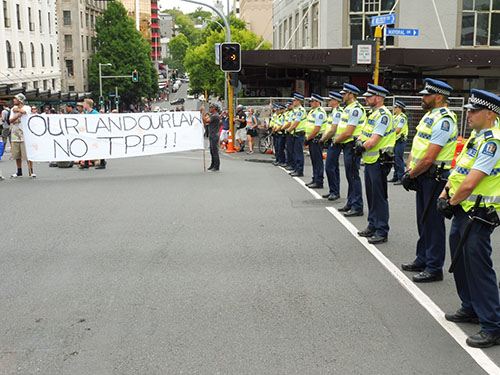
Does the controversial Trans-Pacific Partnership “free trade” agreement between Pacific Rim nations fail to address “the most important issue of our time”? Dominic Pink reports for Asia-Pacific Journalism.
Advocacy groups are criticising what they see as the harmful impact the Trans-Pacific Partnership Agreement could have on the environment.
Several critics have also highlighted fears for Pacific Island nations on the climate change frontline and a lack of environmental coverage from mainstream media.
![]() A recent paper by Simon Terry, executive director of the Sustainability Council of New Zealand, found that “the environment is a significant casualty under the TPPA”.
A recent paper by Simon Terry, executive director of the Sustainability Council of New Zealand, found that “the environment is a significant casualty under the TPPA”.
 Governments can be sued by corporations — under the Investor-State Dispute Settlement (ISDS) provisions — over environmental regulations such as changes to the Emissions Trading Scheme (ETS) and restrictions on the mining of fossil fuels.
Governments can be sued by corporations — under the Investor-State Dispute Settlement (ISDS) provisions — over environmental regulations such as changes to the Emissions Trading Scheme (ETS) and restrictions on the mining of fossil fuels.
The words “climate change” were removed from the final TPPA text, as was any reference to the United Nations Framework Convention on Climate Change (UNFCCC).
One of the deal’s strongest critics is Barry Coates, spokesperson for the It’s Our Future campaign. He outlines two ways the TPPA would negatively impact on the environment if it comes into force.
“One is that action on climate change would be undermined by the ISDS mechanism in particular – if we look at cases that have been taken under ISDS around the world … calculations by Public Citizen show that around 85 percent of those are related to environmental regulation of some sort,” he says.
‘Chilling effect’
The other is a “chilling effect” that the threat of lawsuits would have on a government’s willingness to enact environmental reform.
Laura O’Connell-Rapira, campaigns director for ActionStation, points to recent ISDS examples in North America as evidence of the difficulties that governments are already facing when addressing climate change, such as a US$15 billion lawsuit filed by TransCanada against the Obama administration for rejecting their proposed Keystone XL pipeline.
She is “deeply concerned” about the environmental ramifications.
“In the 21st century, should we be allowing arguably antiquated trade rules to trump climate agreement?” she asks.
Environmental organisations such as the Sierra Club and Greenpeace have pointed out that threats to endangered species would increase under the TPPA, as the unrestricted reduction of tariffs and taxes on imports would include trade in shark fins, palm oil and ivory.

The controversial free trade deal was signed in Auckland last month amid peaceful demonstrations by a crowd of more than 20,000 people, say some reports.
The march was organised by It’s Our Future in collaboration with ActionStation and Real Choice. Several groups of protesters managed to gridlock the city by blocking major arterial routes.
Coates acknowledges that the TPPA is a “complex” issue to grasp, but he believes that the public “understand the big principles behind it … I think there are a lot of people worried that big businesses have too much power”.
Concerns such as secrecy surrounding negotiations, insufficient public discourse, and the perceived threat to New Zealand’s sovereignty as well as Māori rights under the Treaty of Waitangi have been major points of contention among critics since details of the TPPA were first released in November.
‘Liberalising’ trade aims
The TPPA aims to liberalise trade and investment between the 12 member nations — Australia, Brunei, Canada, Chile, Japan, Malaysia, Mexico, New Zealand, Peru, Singapore, United States and Vietnam — which represent approximately 36 percent of the world’s GDP (or about US$28 trillion).
In an official statement, Trade Minister Tim Groser described the TPPA as “a very positive agreement for New Zealand,” breaking new ground as the country’s first Free Trade Agreement (FTA) with the United States, the world’s largest consumer market.
Climate change is increasingly becoming an existential threat to Pacific Island nations, with small states such as Kiribati and Tuvalu facing a bleak future if rising sea levels persist.
Dr Pala Molisa addressed the urgency at the Pacific Climate Change Conference at Victoria University last month, saying, “we’re going to lose islands – we’re going to lose whole countries – because of rising sea levels …
“The Pacific is one of the most vulnerable areas to these super storms and extreme weather events.”
On TPPA, Dr Molisa said it “undermines our ability to respond effectively to these climate crises”.
Biggest issue for Pacific
Economist Dr Biman Prasad, leader of Fiji’s opposition National Federation Party, says “the whole issue for Pacific Island countries right now is climate change adaptation and mitigation”.
He says the touted benefits of a free trade agreement like the TPPA are not key concerns for many Pacific Islands nations, which are “talking about non-tariff barriers, non-trade issues,” including labour mobility and quarantine issues.
Prasad also worries that Pacific nations may find “to their dismay” that the deal impacts on their ability to access funding for climate change adaptation.
350 Aotearoa national director Niamh O’Flynn also expressed concern for Pacific Island nations on the climate change frontline, calling attention to New Zealand and Australia’s “duty of care” to their smaller neighbours.
“If we are unable to carry out that duty it’s a big problem for the Pacific”.
New Minister for Climate Change Paula Bennett has said she wants New Zealand to be a global leader in transitioning to a low-carbon economy. However, she remarked at the Pacific climate conference that “support for climate action has to support sustainable economic development”.
O’Flynn suggests that “actions speak louder than words” and the government has “certainly not shown any action” on Bennett’s recent climate change rhetoric.
“Coming back from Paris [2015 Climate Conference] and instantly opening up more parts of New Zealand’s coastline to be bid for oil shows that the National government is seriously uncommitted to taking any kind of action on climate change”.

‘Lazy’ media coverage
Coates has been “pretty disappointed” by much of the TPPA coverage in New Zealand, claiming “a lot of the media have been lazy and unquestioning of the government’s spin”.
O’Connell-Rapira and O’Flynn echoed these thoughts, criticising a lack of serious reportage on climate change, “the most important issue of our time”.
Coates emphasised that “New Zealanders care deeply about their environment, they care about climate change” and would like to see the media focusing on some of the threats to the environment and climate change.
When asked whether we can expect future anti-TPPA actions, Coates promised “lots”.
“In the meantime [Prime Minister] John Key tends to get confronted in every place that he goes … and I think the government’s very much on the back foot around the TPPA”.
Shortly before going to press, Climate Change Minister Paula Bennett responded to questions for this article, rejecting claims about the environment chapter of the TPPA draft as “simply not true”.
“The environment chapter is the most comprehensive and ambitious outcome that New Zealand has achieved in any free trade agreement and includes a specific article on the transition to a low emissions economy,” she said in a statement to Asia Pacific Report.
Dominic Pink is an Auckland-based student journalist reporting on the Asia-Pacific Journalism course.















































